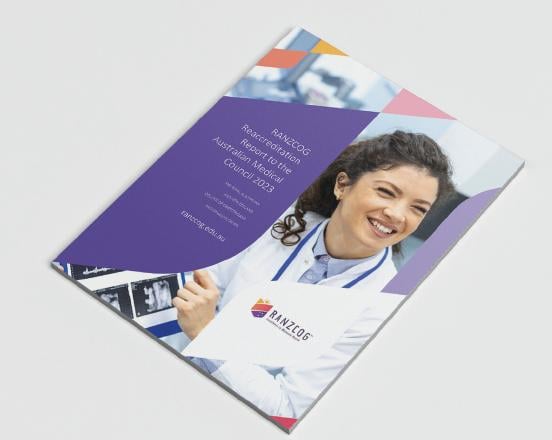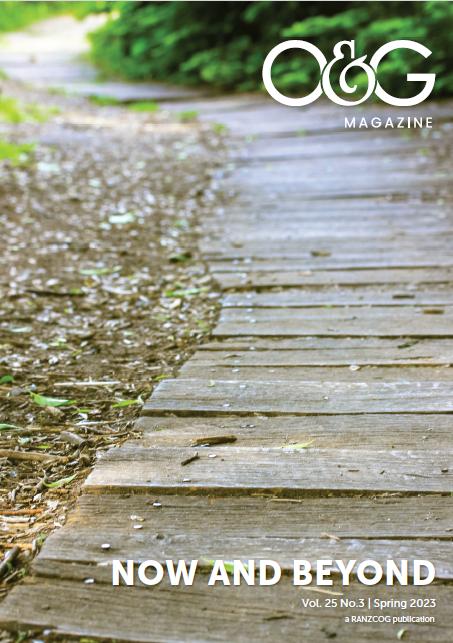What is accreditation?
The Australian Medical Council (AMC), working in collaboration with the Medical Council of New Zealand (MCNZ), is responsible for accrediting RANZCOG as an education provider of specialist medical training programs.
Assessments of the College’s training and education programs are carried out against AMC standards, which cover:
- The context of training and education (including governance).
- The outcomes of specialist training and education.
- The specialist medical training and education framework.
- Teaching and learning.
- Assessment of learning.
- Monitoring and evaluation.
- Support for Trainees.
- Implementing the program – delivery of education and accreditation of training sites.
- Continuing professional development, further training and remediation.
- Assessment of specialist international medical graduates
While annual progress reports are submitted to the AMC each year, a full reaccreditation assessment is conducted by an AMC panel at least every ten years – and this year it was RANZCOG’s turn.
The accreditation panel
The AMC’s Specialist Education Accreditation Committee appoints an assessment team of 6-10 members comprising
- Members from related specialist disciplines.
- At least one member from New Zealand.
- A trainee from another College.
- Members with broader community interests, including expertise in health policy or allied health disciplines.
- Members with relevant educational expertise.
- The option of an international member – RANZCOG requested an RCOG representative.
Components of the accreditation process
Reaccreditation involves many streams of information gathering and represents a significant amount of work for the College.
- Written submission – the College must provide an extensive and detailed analysis of its activities in relation to each of the standards.
- The AMC, by means of surveys, invites trainees, Specialist International Medical Graduates, supervisors and other stakeholders to comment on the College’s training programs.
- Assessment panel members observe the delivery of an examination, in this case the March 2023 FRANZCOG Oral exam.
- The panel conducts training site visits across Australia and New Zealand (22 visits – face-to-face and virtual – were undertaken).
- The panel conducts meetings with key College committees/members, President, CEO, and senior staff – this was undertaken during July Council Week.
How did the College prepare?
The College established an AMC/MCNZ Steering Group in July 2021, chaired by the CEO. In the first instance, the Steering Group was responsible for reviewing the College’s performance against the standards, identifying any significant gaps that needed addressing, and overseeing the work to fill those gaps. Once the AMC formally advised of the reaccreditation assessment (May 2022), the Steering Group also focused on the assessment components and the progress of activities.
Operational activities relating to the reaccreditation were managed by the Executive Director, Education, in collaboration with the CEO, and coordinated by a specially-recruited College Accreditation Project Lead who commenced in November 2022.
The written submission
The written submission is the centrepiece of the reaccreditation process, where the College essentially “puts it all out there” for the AMC panel. The College’s approach was to be open and honest, about both its achievements and shortcomings. Since the Steering Group had already spent time identifying gaps, it was felt that the AMC reaccreditation could hopefully be treated largely as affirmation of the work we already knew needed doing.
Writing a comprehensive analysis of College developments, strengths, weaknesses, accomplishments and challenges against each of the AMC/MCNZ standards was a monumental task. “Writing champions” were first appointed across various staff teams to address relevant areas of expertise. Fellows, trainees and staff contributed content and data to provide a draft which then passed through multiple review stages by the AMC/MCNZ Steering Group, relevant committees, the College’s Consumer Network Working Group and key staff. To further complicate matters, RANZCOG became the first College to go through accreditation under the new “CPD Home” arrangements. This entailed a separate submission against a range of detailed criteria to assess the structure of the College’s CPD program, its delivery, and the support and guidance available. Special credit is due to the College’s Learning & CPD team, and the CPD Committee, who oversaw this particularly vital body of work.
The last tweaks to the reports were still being made on the day of submission (1 May), but they were finally sent a whole 22 minutes ahead of deadline!
Including CPD Homes, the final written submission comprised 380 pages of content with 236 appendices. The Chair of the AMC Panel, who has undertaken a number of reaccreditation assessments, on multiple occasions described it as one of the best submissions she had seen.
You can view the written submission on our website at ranzcog.edu.au/news/college-accreditation/
Two visits for the price of one
The other major event (at least in the College’s direct control) was the panel visit to the College in July, where they were due to conduct a range of interviews to gather information against each of the standards. To prepare for this, the College conducted a mock accreditation visit over two days in the second week of May, convening a panel chaired by an external expert, and including its own senior Fellows – some of whom had participated in AMC panels themselves – as members. Participants in the July visit were invited to attend this virtual event to give them a feel for the types of questions which would be asked. The mock panel certainly didn’t hold back, and there were some curly questions asked. The exercise was very useful in identifying further areas for attention, and formed the base for guidance documentation that we could give those attending the real visit.
The main event – AMC visit and Council Week, July 2023
The College had requested the timing of the AMC visit to coincide with Council Week, simply to avoid double-up of travel and time commitment for many of the key participants. This did though represent a major logistical challenge of minimising overlap of College business with AMC interviews, and ensuring that there were enough rooms available for meetings! And with many more invitees attending College Place in person, feeding everyone enough and at the right times added another complex dimension.
However, it all lies in the planning, and the week ran exceptionally smoothly as those involved moved in some cases from AMC interview to committee meeting and back to an AMC interview. Those with greater commitments were given individual run-sheets to guide their progress through the week. Overall, the week comprised 30 meetings, with 93 College representatives attending AMC components.
Outcomes
The College will receive a draft of the AMC panel’s report in mid-September, against which they can provide comments by mid-October. The final report will then be available towards the end of the year. However, the AMC panel provided a preliminary findings report at the end of the visit, which gives an insight into what we might expect in the final report.
The preliminary findings noted strengths of the College, including strong leadership and decision-making by Fellows and staff throughout the COVID-19 pandemic, highquality training in obstetrics and gynaecology, FRANZCOG curriculum development, support to trainees and their voice in College governance.
In terms of areas for development and improvement, given the College embarked on the process with an open and honest approach and an awareness of its own shortcomings, there were no significant surprises. Main focus areas included:
- Strengthening support for Aboriginal and Torres Islander and Māori health.
- Increasing and improving cultural safety training for Fellows and trainees.
- Consideration of workforce needs, particularly in regional, rural and remote areas.
- Finalisation and implementation of new FRANZCOG curriculum.
- Addressing issues of access to gynaecological surgical training.
- Review of examination and research requirements in training programs.
- Providing feedback on training supervisor performance.
The feeling at the end of the visit – at least from a College perspective – was not just one of relief, but of a wellexecuted activity. The College is in a good position, and can be proud of its achievements, while knowing there is always room for improvement and more work to be done!
A final word
There is insufficient space here to thank all of those involved throughout the AMC/MCNZ accreditation process. It has been a huge undertaking across the College, so whether you contributed to the written submission, reviewed documents, engaged in a hospital training site discussion, planned the logistics for the week of the visit, or were one of the multitude who took the time to attend AMC meetings during that time – our heartfelt thanks.







Leave a Reply